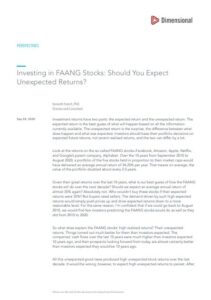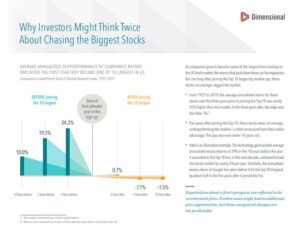It’s very tempting to see the returns on the FAANG stocks—Facebook, Amazon, Apple, Netflix, and Alphabet (Google’s parent company)—and to want to replicate their success in your own portfolio. Who wouldn’t want to earn 34.25% / year for 10 years (as a portfolio of these stocks earned from 2010 – 2020)? But, does their past success mean that they will have similar expected returns in the future? According to Ken French, Professor of Finance at Tuck School of Business (Dartmouth College), “absolutely not.” In his white paper below, “Investing in FAANG Stocks: Should you Expect Unexpected Returns?”, he explains that the high returns of these 5 stocks is due to their “unexpected” (or unpredictable) success, which was over and above what their investors would have predicted 10 years ago. Professor French goes on to explain that “it would be wrong, however, to expect high unexpected returns to persist,” since “it doesn’t make sense to count on good luck.” I have included an additional chart from Dimensional Fund Advisors (see below), which shows that the top 10 largest companies (from 1927-2019) consistently underperformed the market within 5 years of joining the top ten list. So, it doesn’t make sense to “chase” the best performing companies because their past success doesn’t guarantee that they will outperform in the future. Two current examples highlighted in the DFA article below are Intel and Google, who both underperformed the market after reaching the Top 10.
About Christopher Jones
Christopher Jones is the Founder and President of Sparrow Wealth Management, a fee-only financial planning and investment management firm. Before entering the investment field, Chris was a management consultant for Deloitte Monitor. He graduated summa cum laude from Brigham Young University with a B.S. in Economics and a minor in Business Management.







